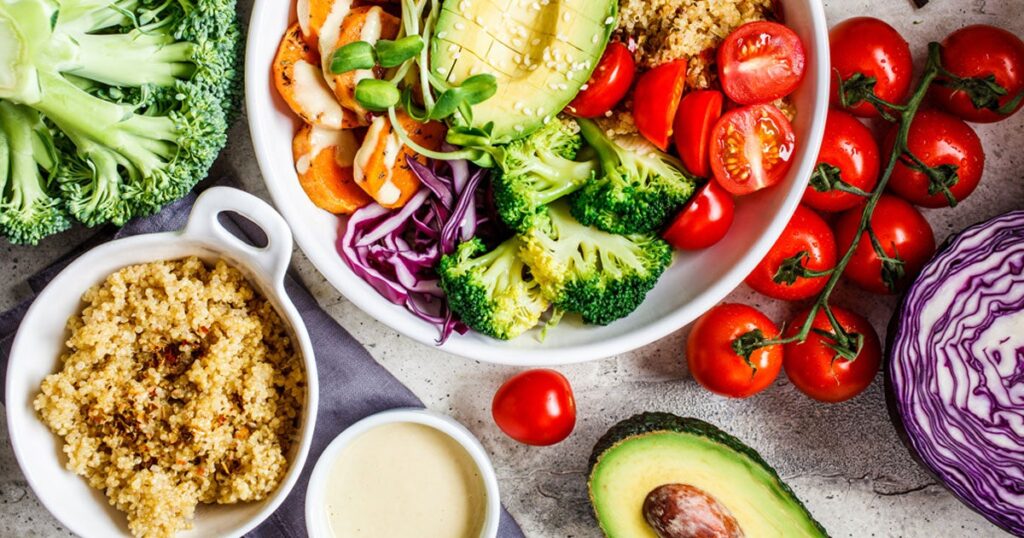
As we age, maintaining optimal nutrition becomes increasingly crucial for promoting health and well-being. A balanced diet packed with nutrient-dense foods can support overall health, boost immunity, and reduce the risk of chronic diseases commonly associated with aging.
In this blog post, we will explore the top foods that older adults should include in their diet to stay healthy and vibrant during their golden years.
Leafy greens
Leafy greens, such as spinach, kale, and collard greens, are nutritional powerhouses for seniors. Rich in vitamins A, C, and K, along with essential minerals like calcium and magnesium, these greens support bone health and reduce the risk of osteoporosis. Additionally, they contain antioxidants that help protect the brain from age-related cognitive decline. Incorporating leafy greens into salads, soups, and smoothies can be a delicious and nutritious way to enhance a senior’s diet.
Berries
Colorful berries like blueberries, strawberries, and raspberries are rich in antioxidants and fiber, making them excellent additions to an older adult’s diet. Antioxidants help combat oxidative stress, reducing inflammation and the risk of chronic diseases. The fiber content aids in digestion and supports heart health. Seniors can enjoy berries as a snack, in yogurt, or as toppings on oatmeal for a delightful burst of flavor and nutrition.
Fatty fish
Fatty fish, such as salmon, mackerel, and sardines, are abundant sources of omega-3 fatty acids. These essential fats are known for their brain-boosting properties, supporting cognitive function and reducing the risk of age-related memory decline. Omega-3s also promote heart health by reducing inflammation and supporting healthy cholesterol levels. Aim for two servings of fatty fish per week to reap the benefits of these healthy fats.
Greek yogurt
Greek yogurt is a protein-rich food that provides probiotics, which are beneficial for maintaining gut health. As we age, the gut microbiome may change, affecting digestion and overall well-being. Probiotics in Greek yogurt help promote a healthy balance of gut bacteria. Additionally, the calcium and vitamin D in yogurt support bone strength, which is especially important for older adults at risk of osteoporosis.
Nuts and seeds
Almonds, walnuts, chia seeds, and flaxseeds are excellent sources of healthy fats, fiber, and essential nutrients. Consuming a handful of nuts daily can help lower LDL (bad) cholesterol levels and support heart health. These nutritious snacks also provide a satisfying crunch and can be sprinkled on salads or incorporated into smoothies for added health benefits.
Whole grains
Whole grains like quinoa, brown rice, oats, and whole wheat are packed with fiber, vitamins, and minerals. They provide sustained energy and support digestive health by preventing constipation and promoting a healthy gut. Replacing refined grains with whole grains in meals like soups, salads, and stir-fries can significantly improve the nutritional value of a senior’s diet.
Legumes
Beans, lentils, and chickpeas are rich sources of protein, iron, and fiber, making them valuable additions to a senior’s diet. Protein is essential for maintaining muscle mass and overall bodily functions. Legumes are also low in fat and can help stabilize blood sugar levels, making them beneficial for individuals with diabetes or those at risk of developing it.
Avocado
Avocado is a unique fruit packed with monounsaturated fats, which are heart-healthy fats that can help lower LDL cholesterol levels. Additionally, avocados contain potassium, which supports heart health and helps regulate blood pressure. The presence of anti-inflammatory compounds makes avocados beneficial for joint health as well. Seniors can enjoy avocados sliced on toast, blended into smoothies, or incorporated into salads.
Colorful vegetables
Colorful vegetables like carrots, bell peppers, and sweet potatoes are rich sources of vitamins, antioxidants, and dietary fiber. These nutrients support immune function, vision, and overall vitality. Encouraging seniors to consume a rainbow of vegetables can ensure they receive a diverse range of essential nutrients for optimal health.
Lean protein
Lean protein sources such as chicken, turkey, tofu, and fish are vital for older adults as they assist in building and repairing muscles, tendons, and other tissues. Protein intake becomes even more critical with age to combat age-related muscle loss and support overall mobility. Seniors should aim to incorporate lean protein in each meal to meet their daily protein needs.
Conclusion
Prioritizing optimal nutrition is a crucial component of elder care in Rockville. The top foods mentioned above can provide numerous benefits for older adults, from promoting brain health and boosting immunity to supporting heart and bone strength. A healthy and well-balanced diet filled with nutrient-dense foods is essential for seniors to enjoy their golden years with vitality and happiness.
Consulting with healthcare professionals or registered dietitians can further enhance personalized diet plans that cater to individual health needs and conditions. Embracing these top foods as part of a healthy lifestyle can lead seniors toward a life of vitality and good health, making elder care in Rockville a pleasant and fulfilling experience.
Leave a Reply